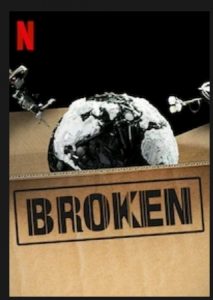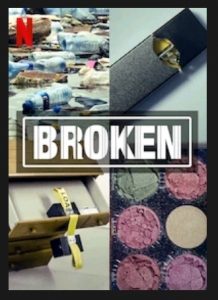Broken
A Netflix Docuseries
Over the Thanksgiving holiday weekend, as I was bingeing shows, I came across the Broken docuseries. It consists of 4 one hour documentaries on makeup, vaping, dressers, and recycling. Despite the wide range of topics, each one held valuable information related to natural living, whether directly or indirectly.
Makeup Mayhem The first episode focuses on how the beauty industry has evolved thanks to social media and influencers. The boom opened the door for scammers to sell knockoff products with harmful chemicals and bacteria that have increased the occurrences of health issues ranging from minor (stys) to fatal (cancer). The desire to use the latest products promoted or even sold by famous beauty bloggers has caused people to go to lengths to acquire hard to get or expensive products from cheaper, less reputable sources. The issues faced in this episode were the very reasons why I chose to start making as many of my own products at home as possible. And despite efforts from law enforcement to crack down on these products, there is just too much flooding the market for them to stop it all from reaching end users. When you make your own, you don’t have to worry about whether or not your lips will be glued together, or if your eye makeup has lead. Is beauty really worth risking your health?
Big Vape The second episode focuses on the rise of the vaping trend. While vaping has proven to be a useful tool in helping smokers quit cigarettes, it has also promoted nicotine use among teens in the US. Many teens aren’t even aware of the presence of nicotine when they start vaping. It is only once they have become addicted and have difficulty quitting that they make the discovery. Even though the products are not intended for teens, questionable marketing and peer pressure have contributed to its popularity. Because vaping is so new, there is not enough information on the effects of long term use. The research done so far has found the presence of metals in the vapor from the heating coils and components of the vape pens/devices. Metals, which are ingested and lead to medical issues. There have been several stories in the news as of late of vaping related illness and even death. Here, we have a case of a lack of education and information on what is being consumed. And as a cherry on top, big tobacco, the very power behind the willful distribution of a carcinogen all to make a profit, is now buying popular vaping companies like JUUL so that they can continue to make money off of future generations with no regard to the potential health risks.
Deadly Dressers The third episode focuses on the manufacture of furniture. While this one didn’t immediately seem like a natural living, sustainability issue, it soon became quite clear how it negatively affects the environment. While several different companies were named, the major focus was on IKEA. Affordable, “disposable” furniture has a huge impact on consumers and the environment. In the past, furniture was made of solid wood and meant to last generations due to its durability. Now, “eco-friendly” furniture is mass produced, precarious, and contributes to illegal logging. Due to poor regulations, whole forests are being demolished and too many families are seeing the fatal effect of subpar craftsmanship in their very own homes. Better regulations are needed to hold companies accountable for knowingly selling products that pose a fatal risk to their consumers and to educate and inform consumers on the dangers of such common purchases as dressers.
Recycling Sham The fourth and final episode focuses on recycling and the effects of single-use plastics. This issue has gotten more attention lately with the introduction of products like paper straws in commercial businesses. But the documentary delves far deeper into the issue, going beyond the process of recycling to the challenges faced and worldwide environmental impact. It is easy to think that recycling is the answer when we don’t see the excess refuse first hand. Out of sight, out of mind. How many people realize that plastic that cannot be recycled was being sent to China? I surely didn’t. Due to negative impacts on air quality and increased pollution, China banned the import of plastics in 2017. This decision had a major impact as the rest of the world scrambled to find a new place to get rid of their waste. The “resolution” was found in Malaysia, a developing country that, in their desperation to increase trade, took over where China left off. Just like China, Malaysia is now seeing the ill effects of taking on the rest of the worlds trash. The people of Malaysia are fighting to save their home. What happens when they decide to follow in China’s footsteps and ban the import of plastic waste from other countries? What will we do with our own waste that is already filling landfills? Once we come face to face with it, will we make a change? Will we continue to let big business buy our government? Or will we wake up and take the steps necessary to reduce this waste before that time comes?
While these episodes focus on very different topics, the message sent from them was consistent. The systems that we rely on to protect and educate us are broken. It is up to us to make a change. The best way to have our voices heard is to let our money speak for us. If we stop spending our dollars on things that are hurting us and our environment, positive changes can be made. As a capitalist country, the US government is a business, and as a business, they are ruled by the almighty dollar. Spend your dollars wisely.

